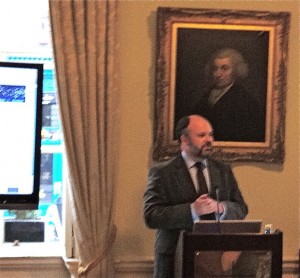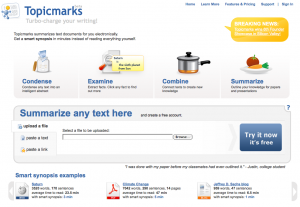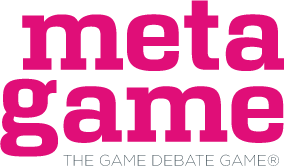From Kevin a discussion of Gamification from Slate Magazine. The article by Heather Chaplin, Gamification: Ditching reality for a game isn’t as fun as it sounds (Tuesday, March 29, 2011) discusses Jane McGonigal’s book Reality Is Broken among other things. Chaplin makes the point that gamification isn’t really that fun and that it is hardly likely to help with the serious ways reality is broken.
Converting the Virtual Economy into Development Potential
From Boing Boing I came across this report: Converting the Virtual Economy into Development Potential is a very interesting report on gold farming, microwork and cherry blossoming. The report describes the economics and value chain of these activities. It discusses some of the ethical issues, but is focused on how these activities could provide good work for developing countries.
NFB: Out My Window
Joyce pointed me to a National Film Board (NFB) interactive work, Out My Window: Interactive Views from the Global Highrise. The work, directed by Katerina Cizek documents the lives of people in apartments through their apartments. For each apartment there is a 360 degree view that you can pan around (sort of like QuickTime VR.) Certain things can be clicked on to hear and see short documentaries with the voice of the dweller. These delicate stories are very effective at giving us a view of apartment life around the world.
Beware Social Media’s Surprising Dark Side, Scholars Warn CEO’s
Jeffrey R. Young has an article in the Technology section of The Chronicle of Higher Education enjoining us to Beware Social Media’s Surprising Dark Side, Scholars Warn CEO’s (March 20, 2011). The article is about a South by Southwest Interactive conference that brought together researchers and industry.
One of the big trends is using crowdsourcing or micropayments to get work done for free or very little. Jonathan Zittrain, a Harvard law professor warned that this could be exploitative.
Mr. Zittrain began his argument against crowdsourcing with the story of the Mechanical Turk, a machine in the 18th century that was said to play chess as well as a human. But the contraption was a showy fraud; a man hidden inside moved the arms of a turban-wearing mannequin. Amazon, the online shopping giant, now offers a crowdsourcing service it calls Mechanical Turk, which lets anyone, for a fee, commission unseen hands to work on tasks like proofreading documents or identifying artists in musical recordings.
The similarity of crowdsourcing to a man shoved inside a box means the practice isn’t exactly worker-friendly, the professor argued. “In fact, it’s an actual digital sweatshop,” he said of the many sites that use the approach.
Fees paid for crowdsourced tasks are usually so meager that they could not possibly earn participants a living wage, Mr. Zittrain argued. He is familiar with one group drawn to the services: poor graduate students seeking spending money.
I wonder if anyone has proposed a code of ethics for crowdsourcing? Thanks to Megan for sending this to me.
A Vision Of Digital Humanities In Ireland
 I just got back from a conference in Ireland titled, A Vision Of Digital Humanities In Ireland (this link is to my conference report). The conference was preceded by the announcement and unveiling of DHO Discover. Shawn Day (in photo above) demonstrated the new discovery tool that brings together metadata about 6000 objects across different digital collections in Ireland. The conference was a capstone event for the Digital Humanities Observatory which is now coming to an end.
I just got back from a conference in Ireland titled, A Vision Of Digital Humanities In Ireland (this link is to my conference report). The conference was preceded by the announcement and unveiling of DHO Discover. Shawn Day (in photo above) demonstrated the new discovery tool that brings together metadata about 6000 objects across different digital collections in Ireland. The conference was a capstone event for the Digital Humanities Observatory which is now coming to an end.
Topicmarks – summarize your text documents in minutes
Thanks to Shawn Day’s Day of DH I learned aboutTopicmarks – summarize your text documents in minutes. It is a commercial version of a basic text analysis tool for summarizing readings. They emphasize how much time you spend not reading the whole document analyzed. It reminds me of a playful name we had for a prototype recommendation engine, “Write My Paper”. Look at the screen shot – some of the features they have that we had in TAPoR:
- Ability to paste text, use an URL, or upload a text
- Summarizer that combines different tool results
- Cooking metaphor (we have recipes)
To be honest, TopicMarks deserves points for a simple and clear interface and clear results. They don’t try to do everything. They are also clear on why you would use this (to save time reading.)
1st Game Design Workshop, Mar 11 – Vadim Bulitko – Picasa Web Albums
As part of research we are doing in GRAND we decided we need a lot more experience designing games. Garry and Patrick ran our 1st Game Design Game (Workshop) on Saturday. (The link takes you to pictures Vadim Bulitko took – thanks Vadim.)
Patrick and Garry developed a meta-game (a game about games) where each team had to pick a card or two from each of three piles (who, when/where, and why). The cards then formed the constraints within which we had to design a game. Later we had to pick two more cards which constrained what sort of game it would be and how we were to present it.
The team I was on picked Who=Non-human, Where=Is Poor, and Uses a Microphone. We came up with a game that was so good that we are now busy patenting it. Above all we had fun making costumes and props.
Digging Into Data: Second Round Announced
The second round of the Digging Into Data has just been announced and they now have one more country (the Netherlands) and eight international funders. (You can see the SSHRC Announcement here.)
The Digging Into Data challenge is an international grant program that funds groups that have teams in at least two countries so it is good that they are expanding the countries participating. What is even more extraordinary is that they have one adjudication process across all the funders (rather than an adjudication process where each national team has to apply to their own country’s program – which never works.)
I was part of one of the groups that got funding in the first round with the Criminal Intent project. I’ve found the collaboration very fruitful so I’m glad they are supporting this for another round.
HuCon 2011: Conference Report
I’m at the HuCon 2011: Current Graduate Research in Humanities Computing organized by the Humanities Computing graduate students here at the University of Alberta. My
conference report is here. It is being written as we go. Milena Radzikowska is the keynote speaker.
Metagame: the game debate game
Garry pointed me to Metagame: the game debate game. This card game reminds me of Scruples – you debate issues triggered by cards and bystanders vote for the better argument. Unlike Scruples this game was designed to be played at a conference. Very neat idea that could be adapted to all sorts of fields.
You can support The Metagame on Kickstarter.




